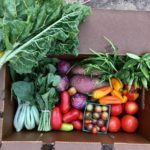Oct 4, 2017
Preserving for the Hall Harvest with Chef Lisa
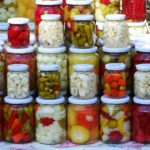
Fall warms up our landscapes and kitchens welcoming warmer flavors and seasonal culinary traditions. Humans have been preserving, fermenting and salting food for centuries and at our September “What’s For Dinner?” free cooking workshop at JFK Library in Vallejo, Chef Lisa led our last cooking workshop of the year and showed us the many health benefits associated with these food preservation processes and how simple getting your probiotics (“good bacteria”). Attendees enjoyed delicious tastings of fruit spread, sauerkraut and other pickled goods.
With a little practice and just a few simple ingredients, you can begin preserving your favorite veggies and fruits while increasing your healthy gut bacteria immediately. Chef Lisa taught how fermented foods in particular, like sauerkraut, are rich in a beneficial bacteria called lactobacilli that reduces overgrowth of pathogens in your digestive tract and relieves a multiple of stomach ailments and supports healthy digestion.
A personal favorite sample creating was a delicious blackberry-vanilla fruit spread that was a delightfully less-sweet alternative to a more gelatinous jam having left out the traditional refined sugar altogether. Without the sugar, these spreads will not gel to a hard-set jam. Surprisingly, the natural sugars of the fruit were just enough to satisfy that sweet tooth. Volunteer teen helpers were ready with tasty samples for the over 20 attendees who seemed to be pleasantly surprised with the results from such easy-to-make, simple recipes.
Although you can preserve and can foods year around, this cooler fall weather allows for less spoilage. You can download all these tasty recipes covered in this workshop by clicking here (Recipes!) .
Oct 4, 2017
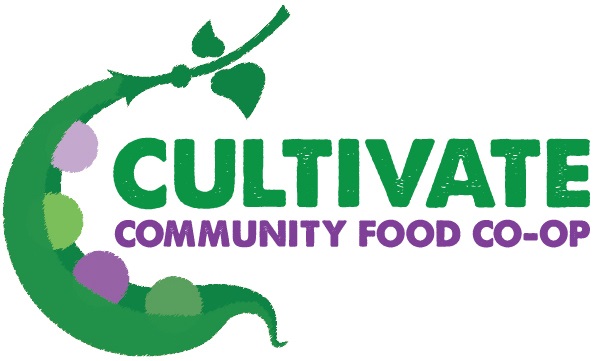
By Cultivate Community Food Cooperative
The experts say it will take a startup food co-op about 3-5 yrs. to open a food co-op grocery store. Well if that is true, then Cultivate Community Food Co-op is right on course. After 18 months of Stage I development – Organizing, CCFC reached Stage II development – Feasibility and Planning, in July, when we filed our Articles of Incorporation.
In September we had an Incorporation party and sold 25 owner shares, (soon we will be selling owner shares online.) Which brings us to October, which just happens to be ‘Co-op month’. Co-op month has been celebrated annually in October across the United States for more than half a century. It is a time for cooperative businesses to reflect on their shared principles and to educate others about the value of belonging to a cooperative.
In doing our part, Cultivate Community Food Co-op will be joining Sustainable Solano in a panel discussion entitled, ‘How to Make the World Better’, on Wed. Oct. 25 at the Heritage Presbyterian Church in Benicia. CCFC’s founder, Paula Schnese, will share with the community the progress the food co-op has made, talk about our future goals and timelines, and answer questions from the audience. In addition to this educational event, during Co-op month, CCFC will
also be sharing information at some of the local farmers markets and at the Loma Vista Farm Harvest Festival on October 21st .
Become an owner of your local food co-op! We will be selling owner shares at all the events we attend! ��
Our Collective Goals
To create a sustainable grocery business based on member ownership and democratic decision-making
To support local producers and sustainable agriculture
To provide health-enhancing foods
To keep prices as low as possible
To be fair and supportive to our employees and to be sensitive to the working and living
conditions of those who make what we sell
To be a community resource that helps the people of Benicia and Vallejo lead healthier lives
To be a place in the community where people can come to gather and create community
To be good stewards of the environment through conscientious, sustainable use of resources
To reach out to low-income members of the community and enable their participation.
To welcome all.
Our Mission
Cultivate Community Food Co-op will be Solano County’s first community-owned, natural grocery store. We will be a one stop, brick and mortar grocer dedicated to providing high-quality, locally-sourced, culturally-relevant, ethically-produced and affordable products.
Offering health and wellness education, we aim to empower our community and provide a public meeting space to engage with others. We are committed to creating and maintaining a more sustainable economy with a just and equitable future for our farmers, artisans, employees and owners by decreasing the physical and social distance between producers and consumers.
Cultivate Community Food Cooperative, Inc. (CCFC) is a cooperative corporation organized under the Consumer Cooperative Corporation Law of California
Become an Owner of CCFC: Owners in good standing may vote in co-op elections, attend the Annual Meeting, and run for the Board of Directors.
Other benefits include:
Coupons, Sales and Discount Days
Case Discounts on Special Orders
Patronage Refund
Discounted Classes
Select a Plan: Online sales will be available on our website soon
Full Fair Share*: Invest $300
Strongly encouraged to facilitate store opening
Partial Share*: Invest $25
Now and every quarter (or more often) until the full Fair Share of $300 is reached
*A $5 processing fee is charged (this helps with the cost of creating membership cards)
Contact Us:
E-mail: info@cultivatecommunityfood.coop
Website: http://cultivatecommunityfood.coop/
Facebook Page: https://www.facebook.com/cultivatecommunityfood.coop/
Mailing address: P.O. Box 94, Benicia, CA 94510
Oct 4, 2017

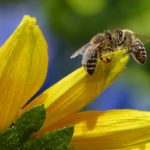
This fall brings in a huge victory for California bees and our local environment! A few years ago, a group of Environmental Justice lawyers representing a coalition of environmental groups filed a lawsuit asking the Department of Pesticide Regulation (DPR) to stop approving the use of neonicotinoids (or, neonics) without proper environmental review. The California Court of Appeal has recently ruled in favor of this moving us one step closer to the long-term health of our lands and wildlife. For nearly a decade, the DPR has approved uses for these toxic pesticides that have proven harmful to our honeybees (a major contributor to our food supply), other wildlife and our local food systems. Neonics can remain in our soil and water supply for years eventually making it into our food chain.
Earthjustice has wasted no time in protecting other wildlife habitats and refuges by petitioning on behalf of American Bird Conservancy for the California Fish and Game Commission to ban the same group of neonics proven to be killing bees. Let us celebrate the tremendous work of Earthjustice and partnering allies for their commitment and tremendous feats in helping protect our environment including our precious, irreplaceable bees.
To read more, visit the Earth Justice website.
Oct 2, 2017
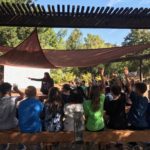
Eight graders chiming in on their future food forest design.
Kathleen, Larry and Elena taught a hands-on swale workshop to the Suisun Valley eighth graders in the spring of 2017 on how to use swales in storing rainwater in the ground. Now that the kids are back in school, designing the Demonstration Food Forest is the next step.
Principal Jas Wright is including the kids in the design of the food forest. To get them thinking about that design, I held five sessions, speaking with seven classes of, sixth, seventh, and eighth grade students. We had a conversation about Fruit Tree Guilds and the importance of choosing a diverse group of plants that benefit each other. Each plant should provide multiple functions.
The kids were engaged asking many questions. The one question that stood out in my mind: What is the opposite of a food forest? The answer is monoculture, the planting of only one type of crop in a given area. Our program encourages planting a polyculture and the importance of including plants that build the soil.
Fava beans have already been part of the Suisun Valley curriculum. Katie, one of the students was excited to tell me how they added nitrogen to the soil by planting fava beans as a cover crop. To prepare the demo garden site, Laura, the Garden Coordinator has already begun to sheet mulch. The site has two mature fig trees and an unidentified, mysterious fruit tree. These three trees will be included in the design.
Now the kids have a base understanding of what a fruit tree guild is. Each class will be responsible for the design, the installation and the care for one guild within the food forest. Over the next 2 weeks they will be naming their guilds and selecting the plants. On a side note, one of the classes is even working on restoring the California Native Plant Garden. So many opportunities to learn!




